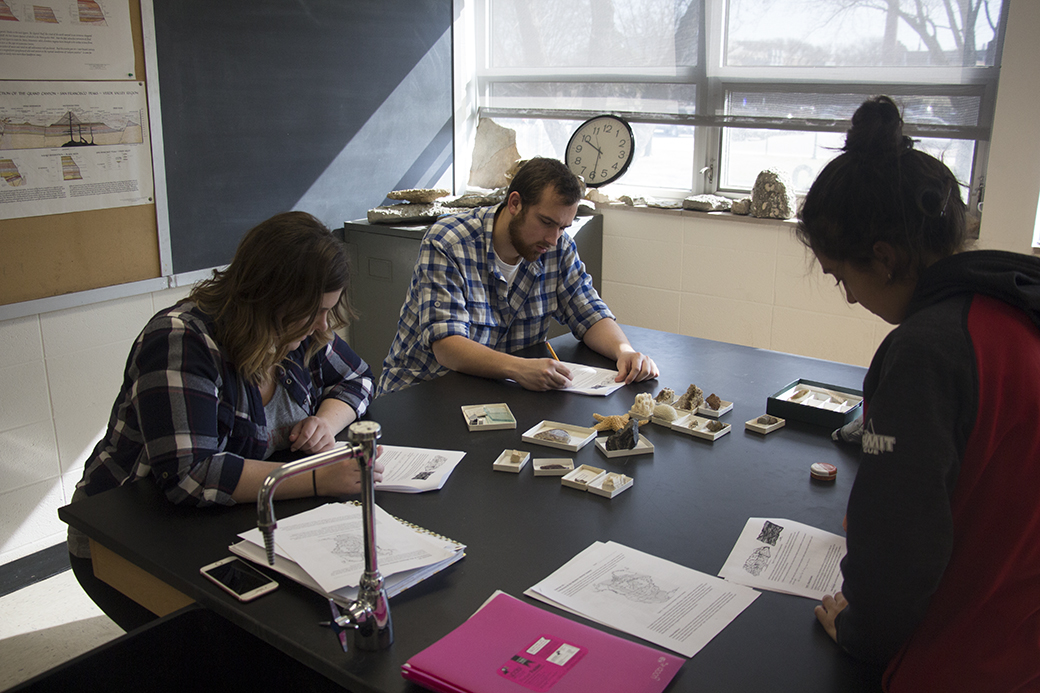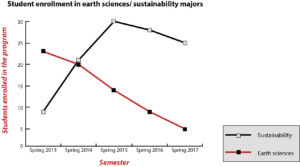
Sustainability to become its own department, consolidate with earth sciences
A big change is coming to USD’s sustainability program and earth sciences department.
In the fall of 2018, faculty from the two disciplines will be united under one designation – the department of “sustainability and environment.” This is a boost for sustainability, which isn’t an official department at USD.
Meghann Jarchow, coordinator of the sustainability program, said it hasn’t really had its own place since starting five years ago.
“Sustainability currently is an interdisciplinary program and not housed in any sort of department within the College of Arts and Sciences,” she said.
Sustainability is also proposing to start its own graduate program, which Jarchow said will work better once sustainability is its own department.
Enrollment numbers in the earth sciences department have been declining for years, and with the chair of earth sciences preparing to retire, it will no longer be offered as a major.
Sustainability and environment will offer a minor in earth science, Jarchow said.
Existing earth sciences majors will be able to complete their degrees, but there will be no new earth sciences majors in the future. Popular earth sciences general education courses, however, will continue to be offered as a part of the curriculum.
The two disciplines have been closely connected since the sustainability program was launched five years ago, Jarchow said.
“Earth sciences right now is really very actively involved in the sustainability courses,” she said. “Most of the courses offered through the earth sciences department are courses that are heavily taken by sustainability majors.”

While Jarchow is the only faculty member specifically devoted to sustainability, the new program will take in two remaining earth sciences professors, and two new faculty members will be hired in the next two years, she said.
“It will structurally kind of help us build capacity for people with official, dedicated time to the sustainability program,” Jarchow said.
End of the road for a major
Clara Kirvold, a first-year earth sciences major, said earth sciences offers a lot more of the hard-science focus she’s looking for, and is a better fit for her plans.
“I’m definitely an environmental person, that’s why I’m doing earth sciences,” Kirkvold said. “But sustainability is closer to a social science than an actual hard science, like chemistry or biology. So for that reason, I wasn’t particularly interested in it, because I hope to be a scientist.”
While she said she understands the decision to eliminate the major because of waning interest, Kirkvold said terminating earth sciences could mean losing students that would’ve majored in it.
“I think they’re going to be missing out on a lot of environmentally-minded, smart students who are interested in that side of it, and they’ll probably all go to (the School of) Mines, or the University of Minnesota,” she said. “I think it’s a loss for the university because they’re missing out on those students.”
Mark Sweeney, an earth sciences professor who will be part of the sustainability and environment program, said he worries parts of the earth sciences discipline might be lost in the transition.
“I think it’s pretty disappointing that we’re not going to have the earth sciences major any more, which is a little bit more rigorous than the sustainability degree in terms of the amount of math and science that students take,” he said. “And also, with the elimination of that major, there won’t be another institution regionally that provides students with that kind of training.”
While he acknowledged the declining enrollment in earth sciences, Sweeney noted that fluctuating enrollment numbers are common in many departments. On principle, Sweeney said he disagrees with getting rid of the major.
“I don’t think that it’s ever a good thing when a university loses an academic major, because it provides less options for the students,” he said.
Sweeney also said that joining forces could make sustainability a stronger, more united presence.
“I guess I could say that it’s an opportunity, even though the earth sciences major is going away, it’s still an opportunity to join forces on campus under one umbrella,” he said.
Brennan Jordan, another earth sciences professor who will be moving to the new department, said this situation has put earth science faculty in an odd position.
“Since the sustainability program started, sustainability and earth sciences have, in some sense, been competing for majors among students who were interested in the environmental sciences broadly,” Jordan said. “And so, while the earth science faculty have been contributing to both the administration and teaching of the sustainability program, we’ve been in the awkward position of also kind of competing to attract majors.”
Provost Jim Moran has given the current earth sciences and sustainability program faculty the task of coming up with a solid plan for the new department this semester, Jordan said.
“We’re definitely still in the planning stages of what this merged department will be,” Jordan said.

